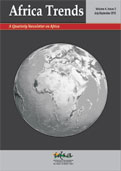Nuclear Attack Submarines: The Elixir for a True Blue-Water Navy
India’s tryst with its destiny for the twenty-first century will greatly depend upon how it prioritises its strategic necessities in the face of current Covid-19-induced economic crisis. While still on course to be the third largest world economy by 2050, India will need to ensure it has the essential tools—economic, military and diplomatic—by then to provide the necessary leverage as a great world power. Great thinkers have stressed and history has shown that maritime power is one such leverage.
- Roby Thomas
- October-December 2020









